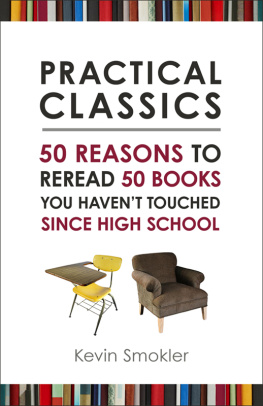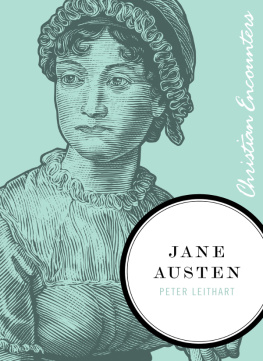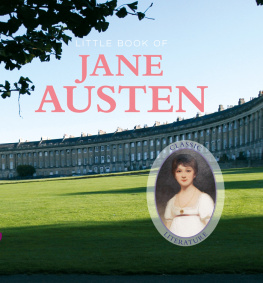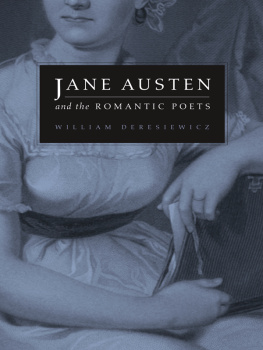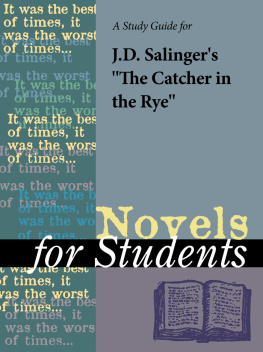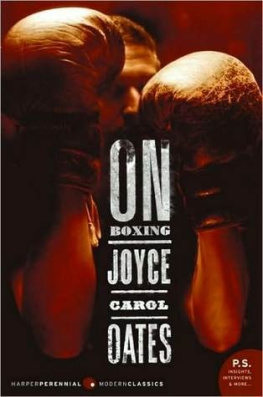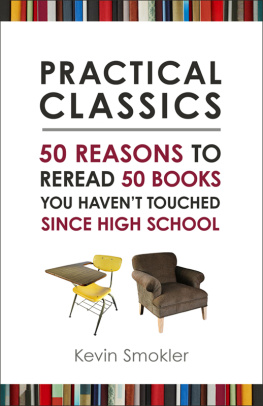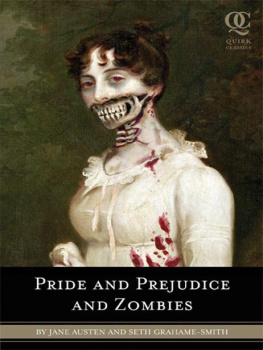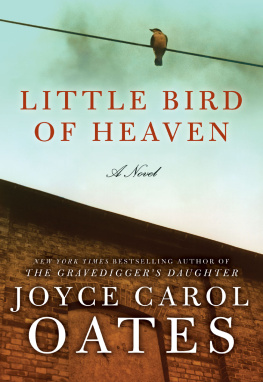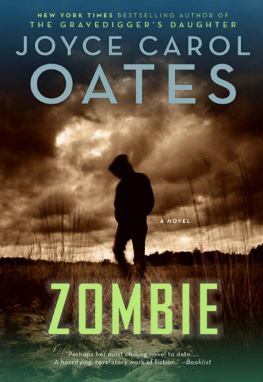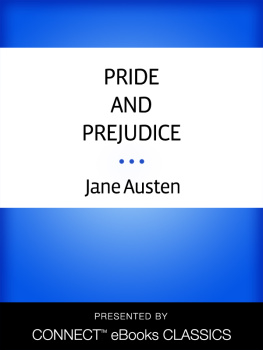Published 2013 by Prometheus Books
Practical Classics: 50 Reasons to Reread 50 Books You Havent Touched Since High School. Copyright 2013 by Kevin Smokler. All rights reserved. No part of this publication may be reproduced, stored in a retrieval system, or transmitted in any form or by any means, digital, electronic, mechanical, photocopying, recording, or otherwise, or conveyed via the Internet or a website without prior written permission of the publisher, except in the case of brief quotations embodied in critical articles and reviews.
Trademarks: In an effort to acknowledge trademarked names of products mentioned in this work, we have placed or after the product name in the first instance of its use in each chapter. Subsequent mentions of the name within a given chapter appear without the symbol.
Cover image of desk Ryan McVay/Media Bakery
Cover image of chair Lawrence Manning/Media Bakery
Cover border of books Lauren Burke/Media Bakery
Cover design by Jacqueline Nasso Cooke
Inquiries should be addressed to
Prometheus Books
59 John Glenn Drive
Amherst, New York 142282119
VOICE: 7166910133 FAX: 7166910137
WWW.PROMETHEUSBOOKS.COM
17 16 15 14 13 5 4 3 2 1
Library of Congress Cataloging-in-Publication Data
Smokler, Kevin.
Practical classics : 50 reasons to reread 50 books you havent touched since high school / by Kevin Smokler.
p. cm.
Includes bibliographical references.
ISBN 978-1-61614-656-6 (pbk. : alk. paper)
ISBN 978-1-61614-657-3 (ebook)
1. Best books. 2. Books and readingUnited States. 3. Books and readingPsychological aspects. 4. Literature and psychology. 5. Smokler, KevinBooks and reading. I. Title.
Z1035.9.S63 2013
011.73--dc23
2012036293
Printed in the United States of America on acid-free paper
For readers, books, and the joy they bring.
13. You May Find Yourself Trapped in
Alexander Portnoys Head...
19. Ive Been Young and Afraid, Joyce Carol Oates.
Thank You for Asking.
33. The Work of Art in the Age of Mechanical Reproduction
by Walter Benjamin, Notes by Kevin Smokler

Deep breath
Thank you to my wonderful agent, Amy Rennert, who placed a very long and uncertain bet on Practical Classics and its nattering author.
Thank you to Mark Hall, Meghan Quinn, Jill Maxick, Steven L. Mitchell, Melissa Shofner, Julia DeGraf, and the entire staff at Prometheus Books for being really good at all the parts of publishing at which Im really terrible.
To my panel of experts: Rebecca Joines Schinsky, Jenn Northington, Stephanie Anderson, Josh Christie, Bethanne Patrick, Michele Filgate, Kit Steinkellner, Jenny Blake, C. C. Chapman, and Baratunde Thurston. They are all smart people. More important: they are all good friends.
An alliance of writers who have been doing this much longer than I have advised me and answered my questions. Without Holly Payne, Peter Orner, Katie Crouch, Dani Shapiro, A. J. Jacobs, Susan Orlean, Justine Musk, Wendy McClure, Jeremy Chamberlin, and Rodes Fishburne, Practical Classics and I would have been up six creeks without a boat.
A nice chunk of this book was written while I was an artist resident at the Ragdale Foundation. The staff and fellows I met there were something else. Big hugs and bigger gratitude.
To everyone I conversate with on Twitter (@weegee), thank you for your attention and time.
To the kids at Philz Coffee Castro who kept me fed, alert, and let me squat.
My friends in San Francisco, New York, and Austin have heard more than enough about my year writing this book. I hope Ive repaid their support by producing something fun to read.
My parents and brothers for believing and making me proud to be a Smokler.
And to my wife, Cariwyl Hebert, who believed, listened, read, and said yes. Our story is my greatest.
Exhale.

I must have been a nightmare in high school English class. English was my favorite subject, and Id loved reading since before I could crawl. My friends and I talked about books with the same mania with which we hoarded quarters for the arcade and wolfed down mozzarella sticks at Dennys. I even had English teachers I liked and keep in touch with today. But with the self-righteousness only an adolescent boy can invent, I saw these teachers as criminals who had stolen books I would have enjoyed beside a swimming pool or in a beanbag chair and turned them into something to be dissected, tested, essayed on, and graded. I didnt care what they did to calculus or chemistry or Spanish. Just leave my damn books alone and dont spoil them with... with... education!
The jerks.
Teaching me was their job. I saw it as a betrayal akin to spending a day at the amusement park then getting socked with a final exam on roller coaster physics. I was an imbecile. But I believed I stood for some literary justice only I was equipped to protect. Books are an essential part of my fun, and you dare make them obligatory? Whats next, turncoats? An in-class essay on The Legend of Zelda? So I spent the better part of my high school English career beating this drum filled with nonsense and generally making everyone elses experience a drag. I complained loudly that Homer was wasting valuable time by including Telemachuss story in parallel with Odysseuss; that of course Gregor Samsa was a cockroach, not just an insect, so move along, please; and that Joe Christmas was a self-destructive moron, so why was Faulkner wasting my afternoon with five hundred pages of Joe Christmas acting moronically?
The moron was me. I was being a martyr for a cause no one else supported and I invented because being righter-than-thou felt good. But if thats true, why, until very recently, did I still feel the same pang of resentment and obligation upon revisiting books from high school as an adult? It certainly wasnt the books fault, but somehow I was blaming them for sucking the fun out of reading. In my memory, Ive conflated not only The Scarlet Letter and O Pioneers! with that kill-joying but also bad complexion, awkward prom dates, and final-exam cramming. And if high school were the best years of your life, you probably werent spending much of them reading anyway. Were perfectly aware that time has passed and that weve all changed and that we can all read whatever we want for whatever reason we want. But we still see a book from those days long ago and think I remember that from high school. Then we sigh.
Im a little wiser now. I know the canonical books of high school are called classics for a reason, and its not because some scold on Sunday morning TV or a secret cabal of English teachers declared them so. But that doesnt shake the idea that the classics and readers get off on the wrong foot, an unbalanced relationship defined by their colossal standing and our adolescent feeling of not quite grasping them but being graded on how well we do. Coming back to them later, we find the classics imprisoned in amber. Either theyre lost monuments from tenth grade or old sages weve kept on the shelf, thanks to our own literary obsessions. Either we can be the kind of reader that read Invisible Man in high school and never looked at it again, or we can be the kind of nut who reads it once a quarter and gets angry when someone doesnt appreciate it exactly as much as we do.

